Consider a word or phrase that makes you feel uncomfortable when it’s pronounced incorrectly. What comes to mind? If you’re learning English, you’re likely aware of several words and phrases that are frequently misused, and you might have thought of a few examples already.
We conducted a survey with nearly 2,000 native English speakers, inquiring about the words and phrases they commonly witness being misused. They were also asked to identify the mispronunciations that annoyed them the most and those that sparked the most disagreements. Lastly, respondents were asked how frequently they corrected someone else’s pronunciation.
What is your English level?
Find out your A1 A2 B1 B2 C1 C2 level of English with our quick, free online test.
Key findings
- The phrase “I could care less” is the most frequently misused expression in America, while the accurate version is “I couldn’t care less.”
- “Irregardless” and “supposably” are the terms that irritate Americans the most.
- A significant portion of Americans, specifically three out of every five, believe it’s appropriate to rectify pronunciation or grammar without being prompted. Among different age groups, millennials are the most inclined to engage in this practice.
The most commonly mispronounced words in America
Prior to the survey, we analyzed Google search trends to determine which words Americans struggle with when it comes to pronunciation.
A recurring theme among many of these words is their foreign origin, which often introduces a subtle phonetic element within the word. This factor can pose a challenge for individuals trying to pronounce these words solely by visual cues.
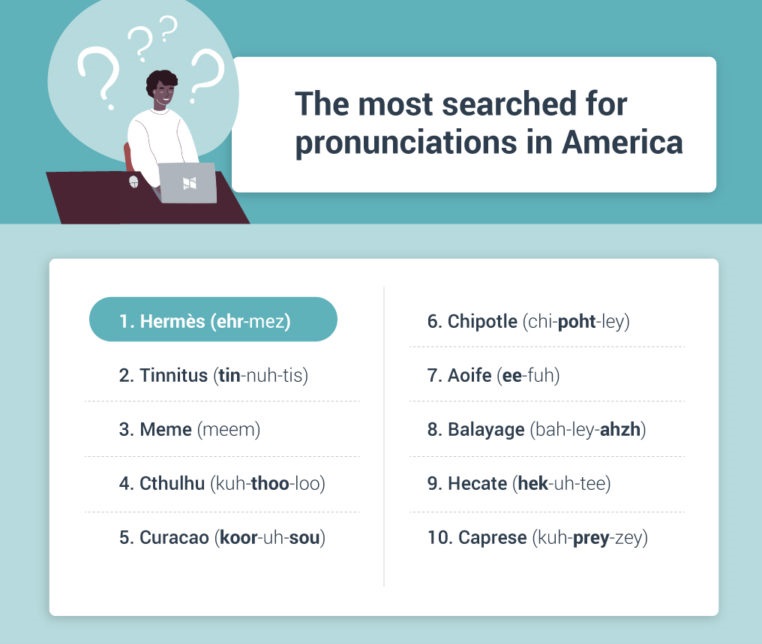
The most commonly misused words and phrases in America
In the initial part of this survey, respondents were inquired about the English words and phrases they frequently encounter being used incorrectly. Their responses covered a broad spectrum, spanning from terms like “anyways” to “deep seeded.”
The phrases that surfaced as the most commonly misused are as follows:
– 59% of individuals mistakenly replace “I couldn’t care less” with “I could care less.”
– 58% employ “would of” instead of “would have.”
– 55% incorporate an additional “s” into “anyway.”
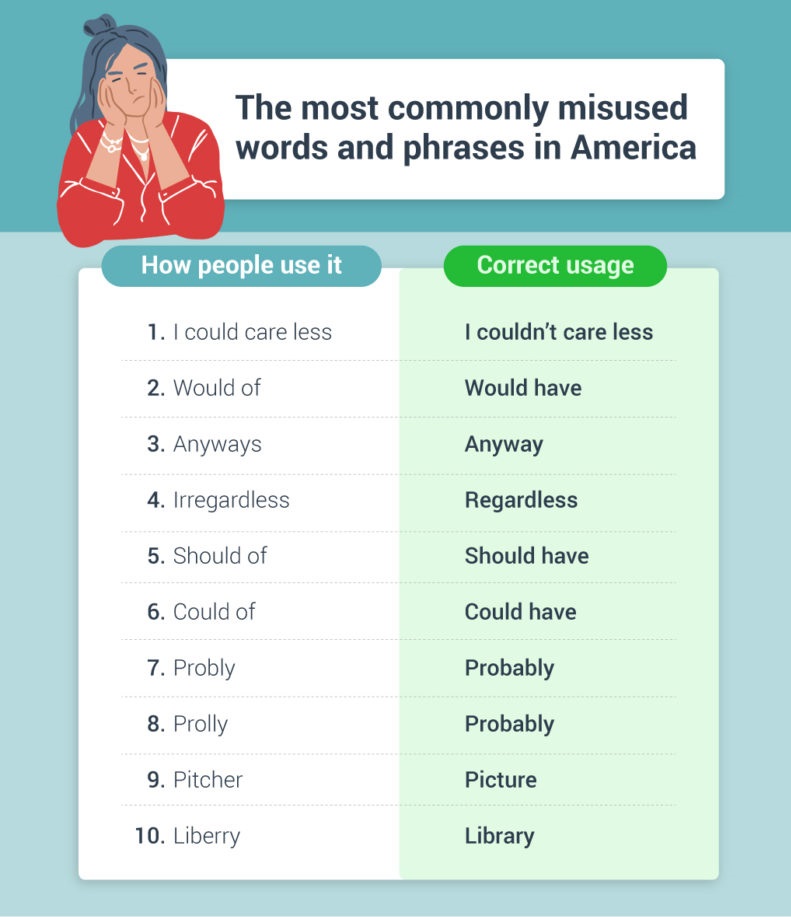
Among the frequently encountered incorrectly used phrases, we can include “for all intensive purposes” (instead of “for all intents and purposes”), “taken for granite” (instead of “taken for granted”), and “there of bouts” (replacing “thereabouts”).
In contrast, the following incorrectly used phrases were less commonly heard:
– 9% mispronounce “fall by the wayside” as “fall by the waste side.”
– 12% of individuals use “beckon call” instead of “beck and call.”
– 14% substitute “ruf” for “roof.”
Surprisingly, more than 2 in 5 respondents admitted to using mispronounced words or misused phrases for over a year. Some of the most prevalent errors included using “celry” in place of “celery,” “case and point” instead of “case in point,” and “lodge” instead of “large.”
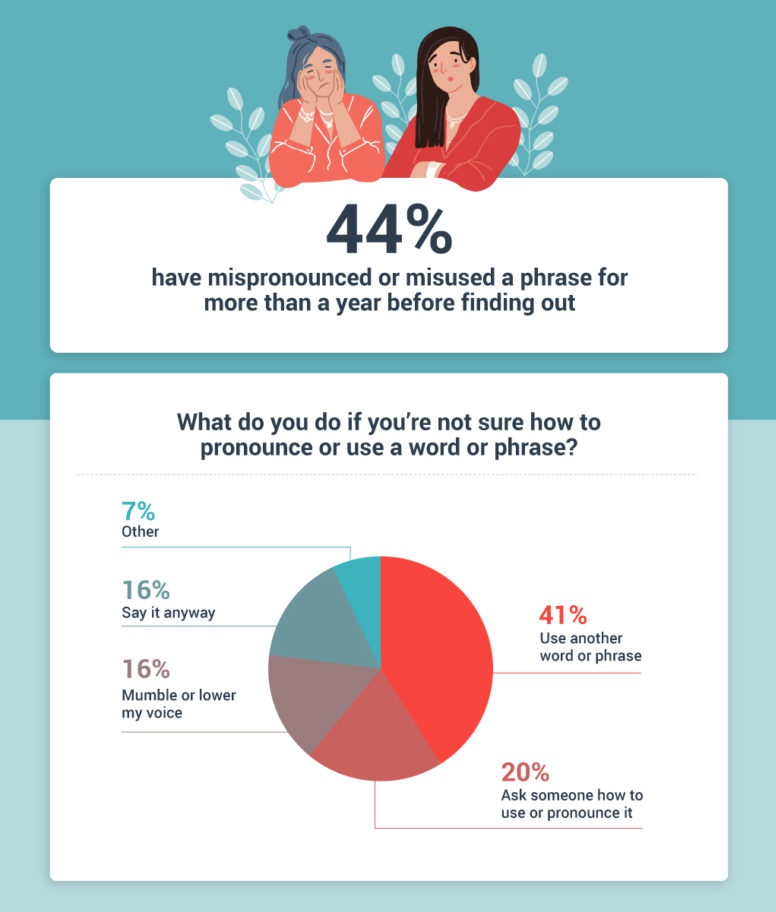
The most annoying misused words and phrases
Over 80% of participants expressed their irritation upon encountering the mispronunciation of everyday words and phrases. Certain misused words and phrases, especially in social settings, provoked a notable level of irritation.
When prompted to prioritize the errors that irked them the most, the following were the top-rated responses:
– 46% express a strong dislike for the usage of “irregardless” in place of “regardless.”
– 44% have a strong aversion to the substitution of “supposably” for “supposedly.”
Additional missteps that induced irritation encompassed the misuses of “should of,” “liberry,” and “mute point.”
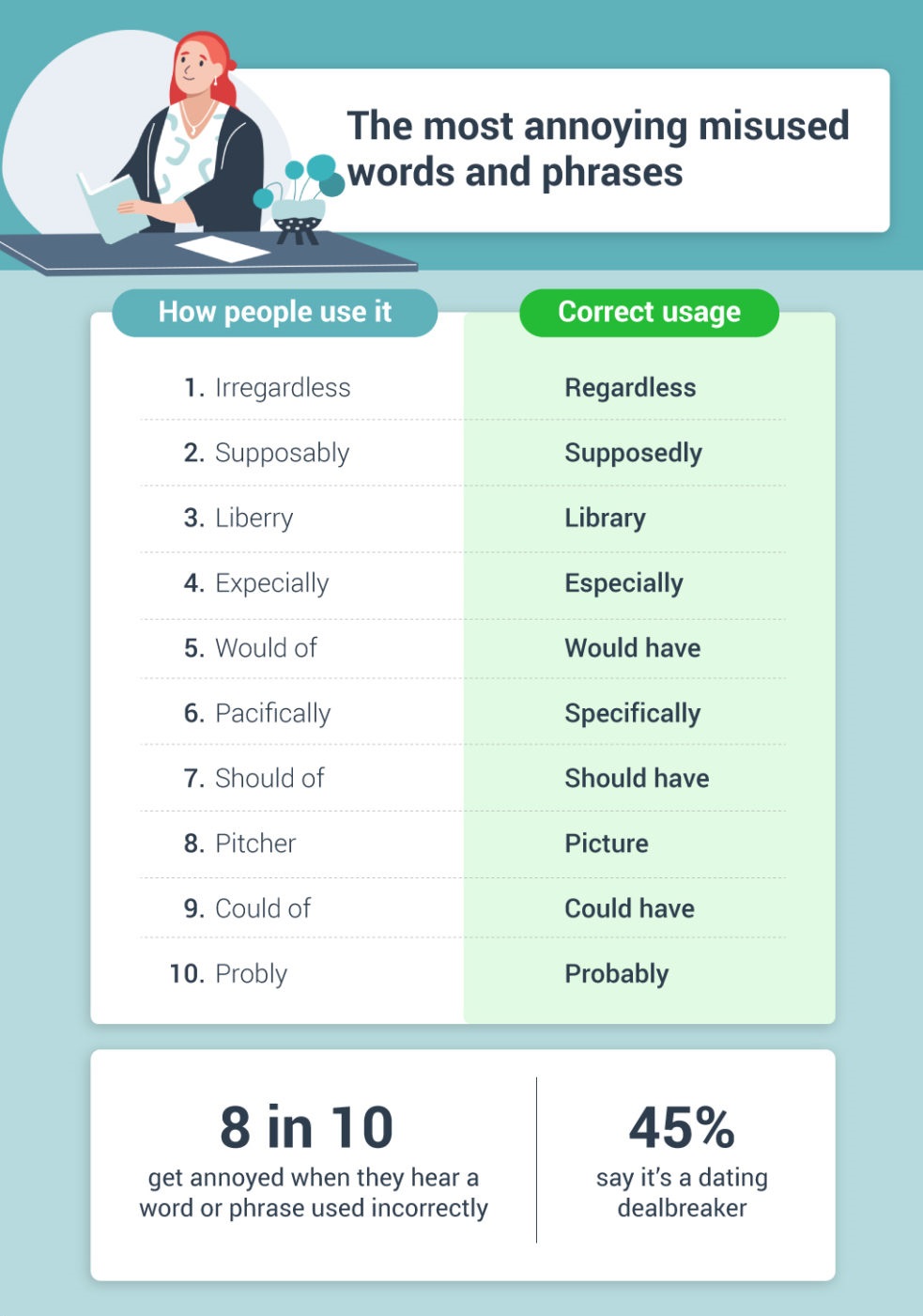
An intriguing discovery revolved around a commonly mispronounced word that doesn’t particularly bother most people. Among those surveyed, 67% pronounce the word “GIF,” as in Graphics Interchange Format, with a hard “G.” However, Steve Wilhite, the creator of the GIF format, has explicitly stated that the word should be pronounced with a “J.” As he once put it, “Choosy developers choose JIF.”
The survey also inquired about how respondents react to these mispronunciations. While some choose to overlook them, one respondent mentioned their ability to disregard the mispronunciation “as long as I understand their intent and meaning.” Nonetheless, many individuals find it challenging to overlook such errors.
In fact, mispronouncing or misusing words in specific social settings elicited the highest levels of annoyance. Nearly half of the respondents indicated that mispronouncing or misusing a common word or phrase is a dealbreaker on a first date.
Are you C1 Advanced English?
Get your C1 Advanced English certificate now!
✓ Add your certificate to your resume
⭐ ⭐ ⭐ ⭐ ⭐
The most disputed pronunciations
Another intriguing finding revealed that specific English pronunciations are the subject of heated debate, and surprisingly, it was often the simplest words that sparked contentious pronunciations. Chief among these was the word “syrup,” with a nearly even split: 51% pronounce it as “sir-up,” while 49% opt for “seer-up.” Similarly, “catty-corner” had 51% in favor of that pronunciation and 49% in favor of “kitty-corner.”
Two other pronunciations generated comparable controversy. “Ant” is considered the correct way to say “aunt” by 55% of respondents, while 45% prefer “ah-nt.” In the case of “route,” the results were even closer, with 53% pronouncing it as “rout” and 47% favoring “root.”
It’s important to note that differences in pronunciation often depend on the speaker’s regional background within the country.
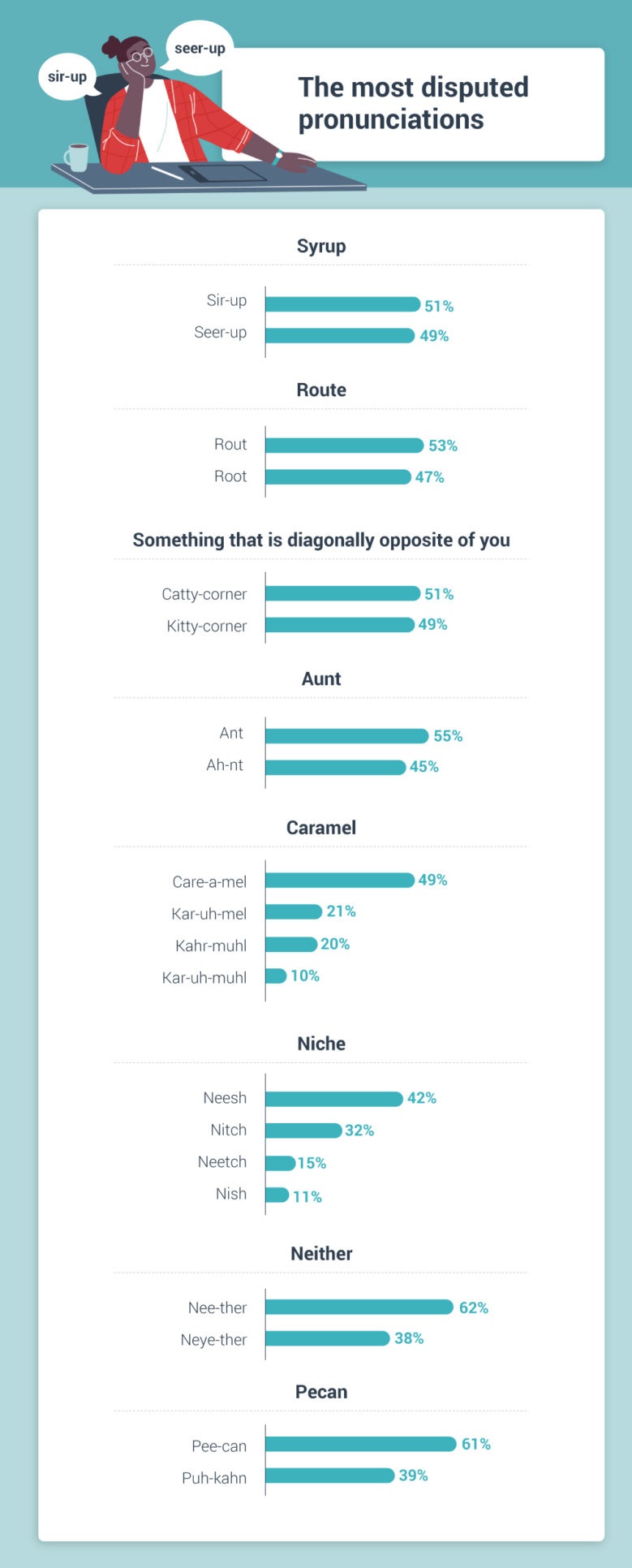
Is it acceptable to offer corrections to others?
The matter of correcting someone’s mispronunciation can be debated from both sides, but a majority of respondents in the survey expressed a willingness to provide corrections or have done so in the past. Notably, 66% indicated that it’s permissible to correct someone, even without being explicitly asked to do so.
However, there were some variations among different age groups. A higher percentage of millennials, precisely 69%, find it acceptable to correct someone, while only 56% of baby boomers share the same perspective.
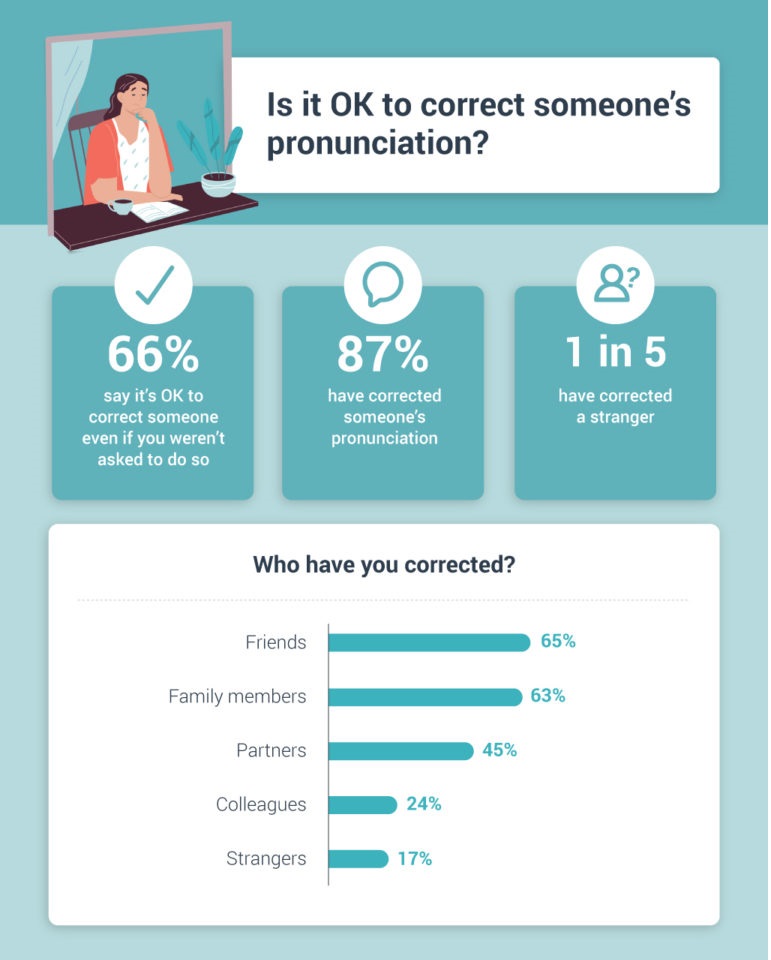
The inclination to offer corrections significantly rises, especially when it involves friends and family, but the odds of correcting a total stranger are relatively low, with only 1 in 5 respondents having done so. Various reasons were provided to justify the act of correcting others. One common explanation was that “anyone who mispronounces anything” should be corrected, while some limited their concerns to “people who argue about pronunciation.”
In terms of gender differences, men are more at ease with correcting someone, with 71% of men feeling okay about it, as opposed to 62% of women. However, both men and women were equally likely to have corrected someone at some point.
This leads to a significant discussion point: the motivations behind correcting others. According to the findings of this survey, it can be asserted that the primary driving force behind corrections is the sharing of accurate knowledge. Among the 79% of respondents who had their own pronunciation corrected, only 15% reported feeling angry or offended. In fact, 35% expressed gratitude for the information, while 28% felt embarrassed.
Considering that nearly 90% of respondents had corrected someone else at some point, it can be concluded that correcting pronunciation is an integral part of the English language. The motivations behind these corrections aren’t always purely altruistic, but one fundamental fact remains: If you mispronounce a word, there’s a good chance that someone will bring it to your attention.
Conclusion
Mispronouncing words or phrases is a prevalent occurrence, with nearly half of the individuals in the study admitting to doing so, at times for extended periods, sometimes over a year. The survey reveals that the most common mispronunciations typically fall into two primary categories: misunderstanding a specific word or phrase, as seen in instances like “taken for granite,” or misunderstanding the meaning of a phrase, as exemplified by expressions such as “I could care less.”
Interestingly, regional dialect variations in pronunciations had little impact on the understanding of the word, and these variations tended to be evenly distributed among the respondents.
The reassuring aspect is that when it comes to pointing out mispronunciations, it’s most often friends and family who take on this role, which is generally more agreeable than receiving unsolicited corrections from strangers in a public setting.
What is your English level?
Find out your A1 A2 B1 B2 C1 C2 level of English with our quick, free online test.





